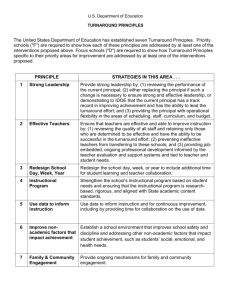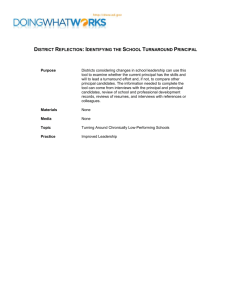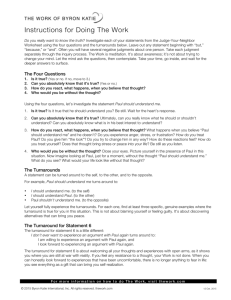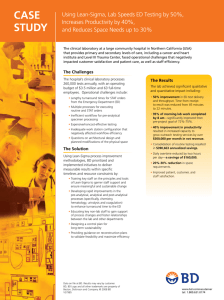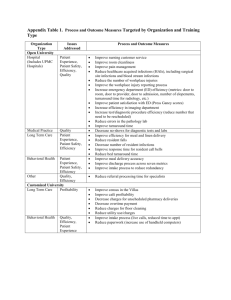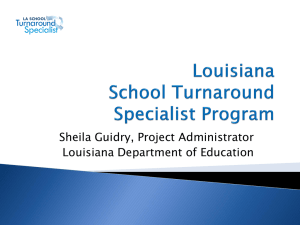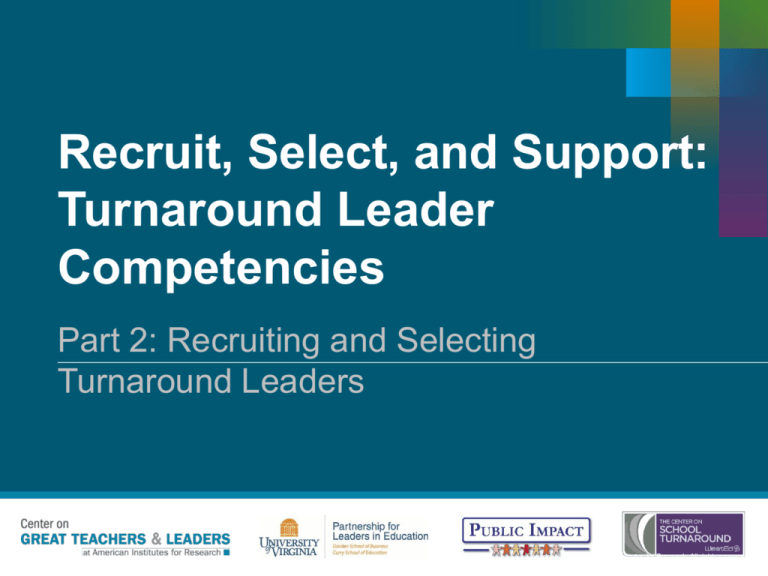
Recruit, Select, and Support:
Turnaround Leader
Competencies
Part 2: Recruiting and Selecting
Turnaround Leaders
Copyright © 20XX American Institutes for Research. All rights reserved.
Welcome and Introductions
2
Introductions
Your name
Your role
What does it take to be a school
turnaround leader?
3
Overview, Outcomes, and Agenda
4
Using Turnaround Leader Competencies
Professional Learning Module
Recruit, Select, and Support: Turnaround Leader
Competencies
Part 1: Understanding Turnaround Leader Competencies
Part 2: Recruiting and Selecting Turnaround Leaders
Part 3: Developing and Supporting Turnaround Leaders
5
Partner Organizations
6
Part 1: Review
Part 1: Understanding Turnaround Leader Competencies
Acknowledged the unique challenges of leading school
turnaround.
Identified leader competencies and actions associated with
turnaround success.
Explored the importance of competencies in turnaround
leader selection and development.
Analyzed school leader behaviors to identify evidence of
competencies.
7
Part 2: Outcomes
Part 2: Recruiting and Selecting Turnaround Leaders
Understand the importance of competencies in recruiting
and selecting turnaround leaders.
Explore ways to recruit leaders with competencies to turn
around persistently low-performing schools.
Experience a competency-based interview and selection
process for turnaround leaders.
8
Part 2: Agenda
Part 2: Recruiting and Selecting Turnaround Leaders
Overview, outcomes, and agenda
Turnaround leader talent management
Competency-based recruitment of turnaround leaders
Competency-based selection of turnaround leaders
Closing and next steps
9
Warm Up: Metaphorical Thinking
Turnaround leaders are like ______________________
because _________________________.
10
Competency-Based
Talent Management
11
Talent Development Framework
(Center on Great Teachers and Leaders, 2014)
Source: Center on Great Teachers and Leaders (2014)
12
Turnaround Leaders
“Typical school district practices are
not designed to recruit and select
talent for challenging schools,
including the bold leaders needed for
turnaround schools.”
(Steiner & Hassel, 2011, p. 2)
13
Turnaround Leader Competencies
• Achievement /
Focus on Sustainable
Results
• Monitoring &
Directiveness /
Holding People
Accountable
• Initiative & Persistence
• Planning Ahead
• Self-Confidence /
Commitment to
Student Learning
• Belief in Learning
Potential
• Impact and
Influence
• Team Leadership /
Engaging the Team
Driving for
Results
Influencing
for Results
Personal
Effectiveness
Problem
Solving
• Developing Others
• Analytical Thinking
• Conceptual
Thinking
(Public Impact, 2008; Spencer & Spencer, 1993; UVA Partnership for Leaders in Education, 2014)
14
Competency-Based Talent Management
Years of experience and academic degrees are not
accurate predictors of performance.
Competencies—habits of behavior and underlying
motivations—can be used to distinguish among
performance outcomes.
Using competencies to select turnaround leaders could
increase the likelihood that turnaround efforts succeed.
(Steiner & Hassel, 2011)
15
Talent Management
P
16
Activity: Principal Hiring Scorecard
17
Reflection: Competency-Based
Leader Selection
Think-Pair-Share
Where do competencies fit in your current leader selection
process?
How could your current leader selection process be
modified to include turnaround leader competencies?
18
Recruiting Turnaround
Leaders
19
Obstacles to Hiring Turnaround Leaders
A shortage of high-quality principal candidates
• More demanding
• Limited authority and autonomy
• Insufficient pay to attract enough candidates
Not selecting the best candidates from the limited pool
• Limited investments in recruiting and selecting candidates
• Overreliance on internal candidates
• Lack of rigor in selection criteria and processes
Administrative inefficiencies resulting in a loss of applicants
• Prolonged interview and hiring process and delays
• Lack of clear vision and support for leaders
(Doyle & Locke, 2014; TNTP, 2006; Clifford, 2012)
20
How Can We Improve the Process?
Make the job more appealing—and manageable.
Pay great leaders what they are worth.
Take an active approach to recruitment.
Evaluate candidates against the competencies and skills
that research shows successful principals demonstrate.
Design the placement process to match particular schools’
needs with particular candidates’ strengths.
Continually evaluate hiring efforts.
(Doyle & Locke, 2014)
21
Recruitment and Selection Process
Recruitment. The district engages in intensive efforts to attract a large
and diverse pool of prospective principal candidates from both internal
and external sources.
Initial Eligibility Screen. The district makes a preliminary assessment
as to each candidate’s basic eligibility.
District Competency Screening. The candidate is evaluated by
trained selectors against an objective set of criteria (interviews and
performance tasks).
School Fit Panel Interviews. From interviews, a diverse group of
school representatives makes a recommendation as to the candidate’s
potential fit with their school.
Hiring. The district superintendent or an appropriate designee formally
approves the hire.
(TNTP, 2006)
22
Building a Candidate Pool
1. Define a Profile of a High-Quality Candidate
2. Develop and Execute a Recruiting Strategy
Project need
Prepare recruiters
Establish an identity
Attract and identify candidates
Determine those with the highest potential
Cultivate and convert high-potential candidates into applicants
3. Build a Pipeline of New Rising Talent
(Cheney, Davis, Garrett, & Holleran, 2010)
23
Competency-Based Recruiting
Articulate the mission, vision, and goals
Identify autonomy, support, and other appealing conditions
Compensate for additional demands and responsibilities
Develop criteria for identifying candidates with turnaround
leader competencies
Solicit recommendations and target outreach to external
candidates
Identify and cultivate high-potential internal candidates
Eliminate barriers that might discourage potential talent
(Doyle & Locke, 2014)
24
Activity: Recruitment
Analyze job announcement and description.
Why would a turnaround leader want this job?
What are turnaround leader competencies articulated in
this job description?
25
Selecting Turnaround Leaders
26
Recruitment and Selection Process
Recruitment. The district engages in intensive efforts to attract a large
and diverse pool of prospective principal candidates from both internal
and external sources.
Initial Eligibility Screen. The district makes a preliminary assessment
as to each candidate’s basic eligibility.
District Competency Screening. The candidate is evaluated by
trained selectors against an objective set of criteria (interviews and
performance tasks).
School Fit Panel Interviews. From interviews, a diverse group of
school representatives makes a recommendation as to the candidate’s
potential fit with their school.
Hiring. The district superintendent or an appropriate designee formally
approves the hire.
(TNTP, 2006)
27
Interview Role Play
Form triads:
• Candidate
• Interviewer
• Note taker
Interview question: What is
the most important thing a
school leader can do to
increase student achievement?
28
Behavioral Event Interviews
Why is a behavioral event interview (BEI) better than a
traditional interview?
Competencies are key predictors of how someone will
perform at work.
Two leaders with the same training and number of years of
experience may have very different performance outcomes.
BEIs ask candidates to describe detailed actions and
thinking in past work events.
Knowing actions that candidates have taken in the past is a
strong predictor of actions they will take in the future.
(Public Impact, 2008)
29
Overview of the Behavioral Event
Interview Process
BEI Process:
Ask the candidate to recall a recent past event when he or
she felt successful or dealt with specific situations.
Ask for a brief summary of what led up to each situation
and the critical milestones or headlines in the story.
Ask the candidate to systematically walk through the story,
recounting exactly what he or she did, said, thought, and
felt and how others responded.
Interrupt to probe for detail and stay focused on the
candidate’s actions, not on the actions of a team.
(Public Impact, 2008)
30
Interview Role Play
BEI triad
• Candidate
• Interviewer
• Note taker
Interview question: Think
about a time when you felt
very successful or proud of
something you accomplished at work and tell me the story.
31
Turnaround Leader Competencies
Two critical competencies for turnaround leaders:
1. Achievement / Focus on Results
2. Impact and Influence
Debrief: What do you notice about the two interview
formats?
See handout with detailed descriptions.
32
Matching Leaders and Schools
Placement should add to the overall hiring process by
providing all schools with the best possible match given their
unique needs and the strengths of individual candidates.
Assess School Needs. Work with each school community
to determine its challenges and strengths to identify the type
of leader most likely to succeed at the school.
Develop Criteria to Assess a Candidate’s Fit With the
School. Create a rubric or similar tool to objectively
compare how well different candidates fit with a particular
school based on the school’s needs assessment and
choose the best match.
(Doyle & Locke, 2014)
33
Closing and Next Steps
34
Wrap-Up: Reflection
Summarize the learning.
Commit to action.
35
Using Turnaround Leader Competencies
Professional Learning Module
Recruit, Select, and Support: Turnaround Leader
Competencies
Part 1: Understanding Turnaround Leader Competencies
Part 2: Recruiting and Selecting Turnaround Leaders
Part 3: Developing and Supporting Turnaround Leaders
36
References
Center on Great Teachers and Leaders. (2014). Talent development framework for 21st
century educators: Moving toward state policy alignment and coherence. Washington, DC:
Author. Retrieved from http://www.gtlcenter.org/talent_development_framework
Cheney, G., Davis, J., Garrett, K., & Holleran, J. (2010). A new approach to principal
preparation: Innovative programs share their practices and lessons learned. Rainwater
Leadership Alliance. Retrieved from
http://www.anewapproach.org/docs/a_new_approach.pdf
Clifford, M. (2012). Hiring quality school leaders: Challenges and emerging practices.
Washington, DC: American Institutes for Research. Retrieved from
http://www.air.org/resource/hiring-quality-school-leaders-challenges-and-emergingpractices
Doyle, D., & Locke, G. (2014). Lacking leaders: The challenges of principal recruitment,
selection, and placement. Washington, DC: Fordham Institute. Retrieved from
http://publicimpact.com/lacking-leaders/
Kowal, J., & Hassel, E. A. (2011). Importing leaders for school turnarounds: Lessons and
opportunities. Charlottesville: University of Virginia’s Darden/Curry Partnership for Leaders
in Education. Retrieved from
http://www.darden.virginia.edu/uploadedFiles/Darden_Web/Content/Faculty_Research/Res
earch_Centers_and_Initiatives/Darden_Curry_PLE/School_Turnaround/importing-leadersfor-school-turnarounds.PDF
37
References
Public Impact. (2008). School turnaround leaders: Selection toolkit. Chapel Hill, NC: Author.
Retrieved from
http://www.publicimpact.com/publications/Turnaround_Leader_Selection_Toolkit.pdf
Public Impact. (2015a). Opportunity culture recruitment toolkit. Chapel Hill, NC: Author.
Retrieved from http://opportunityculture.org/wpcontent/uploads/2015/04/Recruitment_Toolkit-Public_Impact.pdf
Public Impact. (2015b). Opportunity culture selection toolkit. Chapel Hill, NC: Author.
Retrieved from http://opportunityculture.org/selection-toolkit/
Spencer, L. M., & Spencer, S. M. (1993). Competence at work: Models for superior
performance. New York, NY: John Wiley and Sons.
Steiner, L., & Hassel, E. A. (2011). Using competencies to improve school turnaround
principal success. Charlottesville: University of Virginia’s Darden/Curry Partnership for
Leaders in Education. Retrieved from
http://www.darden.virginia.edu/uploadedFiles/Darden_Web/Content/Faculty_Research/Res
earch_Centers_and_Initiatives/Darden_Curry_PLE/School_Turnaround/usingcompetencies-to-improve-school-turnaround.pdf
TNTP. (2006). Improved principal hiring: The New Teacher Project’s findings and
recommendations for urban schools. Brooklyn, NY: Author. Retrieved from
http://www.broadeducation.org/asset/1128-tntpimprovedprincipalhiring.pdf
38
Partner Organizations
For more information on the Partner Organizations:
Center on Great Teachers and Leaders
http://www.gtlcenter.org/
Center on School Turnaround
http://centeronschoolturnaround.org/
Public Impact
http://publicimpact.com/
Darden/Curry Partnership for Leaders in Education
http://www.darden.virginia.edu/darden-curry-ple/
39
Presenter Name
Address
Phone
Email
Website
https://www.facebook.com/xxxxx
https://twitter.com/xxxxx

